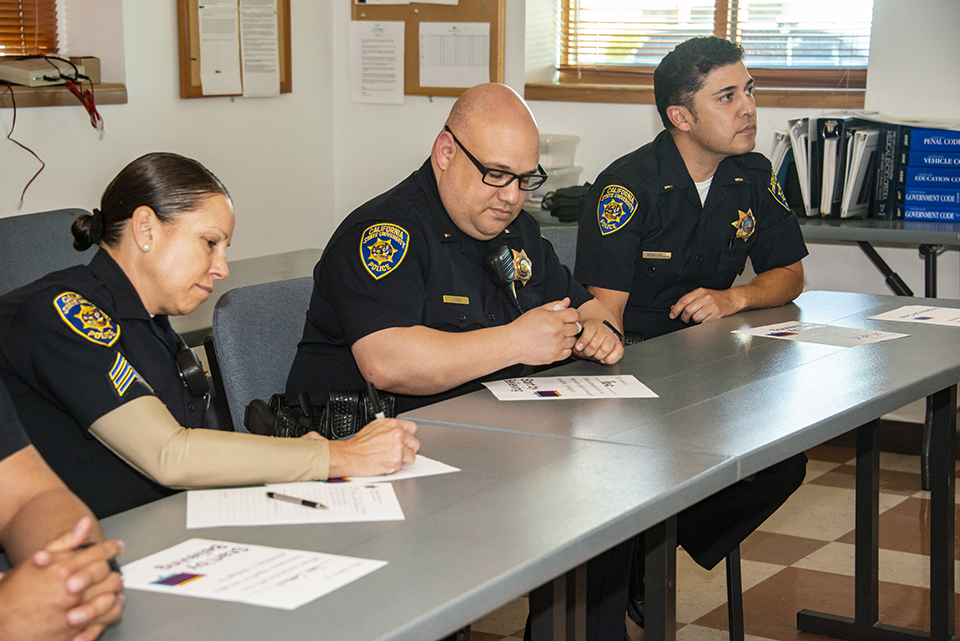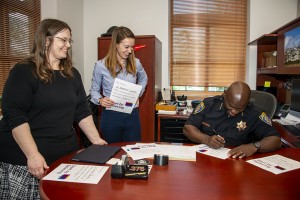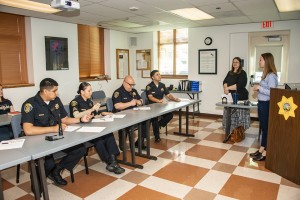CSUN Joins Campaign Against Sexual Violence

CSUN police officers sign the Start by Believing pledge. The pledge is part of a national campaign to end a cycle of silence and a culture of disbelief when it comes to sexual assault. Photo by Lee Choo.
“Start by Believing.” They are three simple words, but can make the difference for a survivor of sexual assault when he or she comes forward to report the attack.
They are words that Katherine Lorenz, an assistant professor of criminology and justice studies at California State University, Northridge, hopes to see spread across not just CSUN, but the rest of the state, as part of an effort to end a cycle of silence and a culture of disbelief when it comes to sexual assault.
“Most sexual assault survivors don’t report the incident to the police,” Lorenz said. “Many survivors are reluctant to tell anyone they were sexually assaulted out of fear that no one will believe them, or that they will be stigmatized or blamed for what happened. If we are truly going to end this kind of violence, then we need to change that.
“The first step is creating an environment where survivors know that when they come forward they will be talking to someone who will listen to them, and believe what they are saying,” she said.

Criminology and justice studies chair Vickie Jensen (left) and assistant professor Katherine Lorenz look on as CSUN Police Chief Gregory Murphy signs the Start by Believing pledge. Photo by Lee Choo.
CSUN’s Department of Police Services has signed on to “Start by Believing” campaign, which originated with the nonprofit End Violence Against Women International.
CSUN Police Chief Gregory Murphy said signing the pledge seemed like an obvious move to him and his staff.
“It’s what we do already — start by believing someone when they come to us to report a crime,” Murphy said. “What this does is send a message to survivors of sexual assault that, in this day and age, they can trust us.”
Since its launch nearly a decade ago, the Start by Believing campaign has been concentrated mostly among the East Coast law enforcement agencies. The campaign involved college and regional police agencies. Lorenz said she is hoping CSUN can help change that. CSUN’s police department is one of only two police departments in the CSU system, the other being CSU Chico. Other police departments that have joined the effort include Huntington Beach, Santa Monica, and USC, Lorenz said.
“CSUN is a natural place to bring the program,” she said “We genuinely care about our students and we have all these resource available to support those who come forward.”
Lorenz noted that research shows that out of every 100 sexual assaults that occur, only about 30 or fewer are reported, and of those fewer than 5 percent result in prosecution.

Criminology and justice studies assistant professor Katherine Lorenz (far right) and criminology and justice studies chair Vickie Jensen (second from right) speak to a group of CSUN police officers about the Start by Believing campaign. Photo by Lee Choo.
“These are startling statistics,” she said. “Many survivors drop out of the legal process after initially reporting because they feel mistreated by the process, that they have been judged for their actions and that they are not believed or treated as not credible.
“Studies have shown that when a police officer presents a supportive response from the beginning — with the orientation that the assault happened — victims are more likely to provide information to the officer, take part in the legal process and assist in helping to strengthen the investigation,” Lorenz said.
Lorenz and Murphy dismissed criticisms that if law enforcement officers “start by believing” survivors of sexual assault, they will taint the investigation.
“Why is it that many in society deem it okay to doubt or blame the victim of sexual assault?” asked Lorenz. “When a house is burglarized, we don’t blame the victim for leaving their jewelry out on their dresser or their computer, television and other valuables out in plain view. The reality is that few sexual assault reports are actually false, so there is no reason to assume a victim is lying.”
Murphy emphasized that sexual assault is a crime, and to effectively investigate the crime, the victim needs to feel they can report it to law enforcement.
“It is important for all parties to know that when things are reported to the police department that we take those reports at face value,” Murphy said. “Once the report is filed, we will be guided to where the investigation takes us.”

 experience
experience